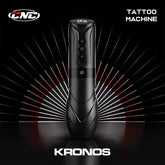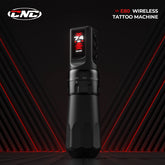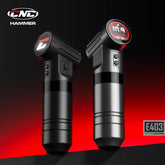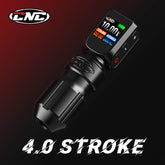Coil vs. Rotary Tattoo Machine: Which One Should You Choose?
When it comes to choosing the best tattoo machine, artists often face one of the oldest debates in tattooing — Coil vs. Rotary Tattoo Machine. Both have earned their place in studios around the world, but they work in completely different ways, offer unique advantages, and suit different types of tattoo artists.
If you’re new to tattooing or simply considering upgrading your setup, understanding how each machine works and what makes them different is key to finding your perfect match. In this guide, we’ll break down the working principles, pros and cons, and suitability for beginners — and help you decide which one deserves a spot in your toolkit.
1. How Each Tattoo Machine Works
Before we get into which one is “better,” it’s important to understand how each machine operates. The tattoo machine’s mechanism affects everything — from precision and comfort to the overall tattooing experience.
Coil Tattoo Machine

The coil tattoo machine is the traditional workhorse of the tattoo world. It uses electromagnetic coils to move the needle up and down.
Here’s what happens inside:
- When electric current passes through the coils, it creates a magnetic field that pulls a metal armature bar downward.
- This motion drives the needle into the skin.
- As the circuit breaks, the magnetic field collapses, and the armature bar springs back — repeating the cycle rapidly.
This electromagnetic push-pull creates a powerful, fast, and punchy needle movement, making coil machines famous for their strength and precision. However, that same mechanism also produces a noticeable buzzing sound and vibration.
Coil tattoo machines are typically separated into two main types:
- Liner machines, optimized for crisp, clean outlines.
- Shader machines, tuned for smooth shading and color packing.
Experienced artists often own multiple coils for different functions.
Rotary Tattoo Machine

The rotary tattoo machine takes a different approach. Instead of electromagnetic coils, it uses a small electric motor to power the needle’s movement.
The motor spins an eccentric cam or crank wheel, converting rotary motion into a linear up-and-down motion. The result? A consistent, smooth operation with minimal noise and vibration.
Because of its simplicity, a rotary tattoo machine is often lighter, quieter, and more versatile. It can handle lining, shading, and color work with just a few adjustments — or even automatically adapt based on needle type and voltage.
Modern rotary machines, especially wireless rotary tattoo machines, have taken the market by storm due to their efficiency, mobility, and ease of use.
2. Coil vs. Rotary Tattoo Machine: Pros and Cons
Let’s look at what makes each machine shine — and where it falls short.
Coil Tattoo Machine: Pros
✅ Powerful and precise: Coil machines deliver strong hits, making them ideal for bold lines and solid color packing.
✅ Customizable: Artists can fine-tune coils for speed, hit strength, and stroke length to suit their unique style.
✅ Authentic “tattoo feel”: Many traditional artists love the tactile feedback and audible buzz that comes with coil machines.
✅ Durability: Simple mechanical construction means long-term reliability when properly maintained.
Coil Tattoo Machine: Cons
❌ Heavier and noisier: The buzzing sound and vibration can be fatiguing during long sessions.
❌ Requires frequent tuning: Coil machines need regular maintenance and adjustment for consistent performance.
❌ Steeper learning curve: New artists may find it harder to control line consistency and needle depth.
❌ Limited versatility: Usually, one coil machine serves one purpose — either lining or shading.

Rotary Tattoo Machine: Pros
✅ Lightweight and ergonomic: Perfect for extended sessions with less wrist strain.
✅ Quiet operation: Minimal noise creates a calmer experience for both artist and client.
✅ Low maintenance: Fewer mechanical parts mean less cleaning, tuning, and breakdowns.
✅ Multi-functional: A single rotary can handle lining, shading, and color packing with simple voltage or needle changes.
✅ Beginner-friendly: Smooth, consistent performance makes it easier for new artists to learn.
Rotary Tattoo Machine: Cons
❌ Less punch: Rotary machines often deliver softer hits compared to coils, which may not be ideal for strong lining or heavy color packing.
❌ Less tactile feedback: Some artists miss the “feel” and rhythm that a coil machine provides.
❌ Higher price (for premium models): Top-tier rotary or wireless models can be quite expensive.




3. Which Tattoo Machine Is Best for You?
The right choice depends on your tattooing style, skill level, and personal comfort.
Coil Tattoo Machines Are Best For:
- Experienced tattoo artists who value precision and control.
- Those who love traditional tattooing or bold-line work.
- Artists who don’t mind manual tuning and mechanical adjustments.
- Tattooists seeking a powerful “punch” for color saturation or thick outlines.
If you specialize in American Traditional, Blackwork, or Neo-Traditional designs, a coil machine is a natural fit.
Rotary Tattoo Machines Are Best For:
- Beginners learning the fundamentals of tattooing.
- Artists who want one versatile machine for lining, shading, and coloring.
- Those who prefer quiet, low-vibration operation.
- Artists who value comfort during long tattoo sessions.
Rotary tattoo machines are also ideal for styles like realism, watercolor, fine line, and portrait work, where smooth shading and subtle gradients are essential.
Which Is Better for Beginners?
For most beginners, the rotary tattoo machine is the clear winner.
It’s easier to use, requires little to no tuning, and offers a smoother, more forgiving learning curve.
A wireless rotary tattoo pen, for example, allows beginners to focus on technique and design rather than machine maintenance.
However, learning with a coil machine can still be valuable for understanding needle behavior, depth, and timing — skills that improve your control as a tattoo artist.
4. Key Factors to Consider When Choosing a Tattoo Machine
Selecting between coil and rotary isn’t just about power or design — it’s about matching the machine to your tattooing goals and working style. Here are some factors to think about before making your choice:
Tattoo Style
- Traditional & Bold Designs: Coil machines excel at bold outlines and saturated color.
- Realism & Fine Line Work: Rotary machines are better for smooth shading and delicate gradients.
Comfort & Handling
- Coil machines are heavier and may cause fatigue.
- Rotary machines are lightweight and ergonomic, reducing wrist strain during long sessions.
Maintenance & Adjustment
- Coil machines demand regular tuning and cleaning.
- Rotary machines are practically plug-and-play with minimal upkeep.
Noise & Vibration
- Coils produce the classic tattoo “buzz.”
- Rotaries operate quietly, creating a more relaxed atmosphere for clients.
Budget
- Coil machines are generally cheaper upfront.
- Rotary and wireless tattoo machines may cost more but provide better long-term value through convenience and reliability.
Future Growth
If you plan to evolve your tattoo career and experiment with various styles, investing in a high-quality rotary tattoo pen might be the smarter long-term choice.
Modern options like the CNC KRONOS Wireless Tattoo Machine or CNC Q2 Tattoo Pen combine rotary smoothness with digital control, giving artists ultimate flexibility.
5. Final Thoughts: There’s No One-Size-Fits-All
The truth is — neither the coil nor the rotary tattoo machine is universally better. Both have their own strengths, and the “best” choice depends entirely on your technique, comfort, and artistic goals.
If you’re a traditionalist who loves bold lines and full saturation, the coil tattoo machine might always have your heart.
If you’re a modern artist who values versatility, comfort, and quiet performance, the rotary tattoo machine could be your perfect match.
Ultimately, the most successful tattoo artists learn to understand both. Mastering how each machine behaves gives you more creative control — and makes you a more adaptable artist in the long run.
| Feature | Coil Tattoo Machine | Rotary Tattoo Machine |
|---|---|---|
| Mechanism | Electromagnetic coil | Electric motor |
| Power | Strong, punchy hit | Smooth, consistent hit |
| Noise | Loud buzzing | Quiet operation |
| Weight | Heavier | Lightweight |
| Maintenance | Requires tuning | Low maintenance |
| Versatility | Usually single-purpose | Multi-purpose |
| Best for | Bold lines, traditional tattoos | Fine line, shading, realism |
| Beginner-friendly | ✖ | ✔ |
Final Tip
If you’re still unsure, start with a rotary tattoo machine — preferably a wireless model with adjustable voltage and stroke options.
As your skill grows, you can add a coil tattoo machine to your setup for those moments when you crave that raw, classic power.
No matter which you choose, the right tattoo machine is the one that lets your art flow effortlessly.










